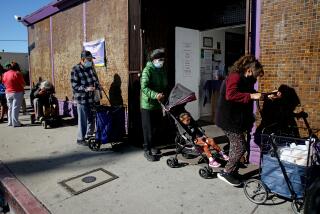PERSPECTIVE ON HOUSING : Adding Fuel to the Fires
- Share via
With another fire in a converted garage in Sun Valley, we have come face to face with the truth that lack of affordable housing can spell death. In December, five children lost their lives in a burning garage. Now two more young girls and their grandmother join them.
The trail of responsibility leads out of these garages and up the chain of our municipal bureaucracy. When it gets to the City Council and the mayor, we too often hear that this is a “code enforcement” issue. More building inspectors would ferret out some of the 40,000 families living in illegal units, mostly garages, but where would they go? Do we really expect them to choose the street over a converted garage? This is not a code enforcement issue but an affordable housing crisis.
The city recently approved a plan to offer deferred loans to police officers wanting to buy homes in Los Angeles--a recognition that many full-time working families cannot afford to live here without assistance. This should have been part of a comprehensive housing policy for the city. Unfortunately, it was only a blip on the housing radar, not indicative of any coherent policy or understanding of the housing crisis we face.
Instead of leading the city in a direction that would make us a model for the nation, the mayor’s office is proposing to reduce the Los Angeles housing budget by $14 million. Mayor Riordan wants to take federal community development block grant funds from housing production and use this money in “targeted neighborhoods,” 11 council districts that will get $1 million each to do with what they want. This money would provide about 1,000 more units of much needed housing this coming year. And while targeting neighborhoods with flexible money is a good idea in concept, it also is open to abuse. Improving facades, building bleachers and parking lots because they are locally determined shows an appalling lack of leadership at best and overt pork barrel politics at worst.
Using this money for housing, as originally intended, also would bring sorely needed additional financial resources to the city. The $14 million that Riordan proposes to cut would leverage an additional $50 million for the local economy through tax credits and other sources. And since housing production is a major economic development machine, this money would produce more than 300 new jobs if it was left for housing production.
Los Angeles has the worst affordable housing crisis in the nation. For more than a decade, we have been among the top 10 metropolitan areas with the highest housing costs. And although rents have dropped in recent years due to the recession, so have wages; the wide gap between rents and wages remains. While police officers definitely deserve a break so that they can live in the city where they work, so do all workers.
The average two-bedroom apartment in the Los Angeles area rents for $855 a month. Even with an increased minimum wage, a family with two full-time workers needing two bedrooms must spend more than half of its gross monthly income for rent. A family fortunate enough to earn the new “living wage” passed by the City Council this week still will pay more than a third of its gross income for rent. And since buying a house will remain out of reach for these families, they will stay renters as their families grow. If they require three or four bedrooms, they will pay even higher portions of their incomes for rent, leaving precious little for such luxuries as clothing, food and health care.
Families facing these choices are forced to pay too much for rent, to live in overcrowded units (estimates from the last census indicate that as many as 20% of rental units in Los Angeles are severely overcrowded, with more than 1.5 persons per room). They live in substandard units (there are more than 140,000 slum dwellings in Los Angeles). They go without other necessities to keep a roof over their heads. They live in garages that burn, like the one that housed Maria Magdalena Gonzalez and her granddaughters in Sun Valley.
The City Council is scheduled to vote on this proposal today. Council members have the opportunity to provide needed housing for the city, attract other investment dollars and provide jobs. Or they can take the money away from housing and watch the fires burn.
More to Read
Sign up for Essential California
The most important California stories and recommendations in your inbox every morning.
You may occasionally receive promotional content from the Los Angeles Times.






